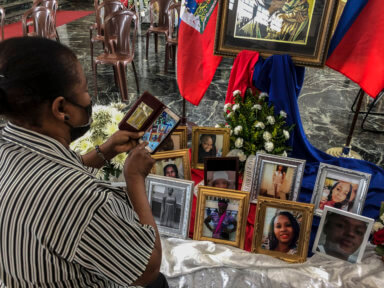News
Caribbean RoundUp

ANTIGUA
The Antigua and Barbuda Prime Minister, Gaston Browne is threatening to sue Trinidad and Tobago government for US60 million over the collapse of the T&T based CLICO and the British American Insurance Company (BAICO) in 2009.
Speaking recently on the online news source, Antigua Breaking News last week he said,”We are pursuing litigation against Duprey and Company and possibly we may eventually have to sue the government of Trinidad and Tobago, because as you know they had agreed to provide a settlement of US$100 million.”
He said that of that sum, the GOTT had paid about $40 million.
“But the balance about $60 million remains unpaid.we have written to the government of Trinidad and Tobago. They have not even treated us with the type of respect that is typical among countries and colleagues, so we will be writing to them again. This is probably going to be the third time,” Browne said.
“I mean if they continue to treat us with contempt, we will have no choice but to sue them,” he added.
Browne said he took over the chair of the sub-committee on insurance in the Eastern Caribbean Currency Union last year.
Since then, he said, significant progress has been made in recovering some of the investments in CLICO made by residents of the Eastern Caribbean.
A group of British American and CLICO policyholders in the Eastern Caribbean filed a lawsuit at the Caribbean Court of Justice against the government of T&T in October 2021.
BARBADOS
Barbados is shipping 1,000 black-belly sheep, which are expected to arrive in Guyana this week.
This was revealed by Minister of Agriculture, Zulifikar Mustapha as he addressed residents of surrounding communities in Region Five.
“We will have 1,000 black-belly sheep coming from Barbados. Before they leave, they will be examined for signs of illness,” he said.
Earlier this year, Guyana’s President Dr. Mohammed Irfaan Ali launched the black-belly sheep project and declared that Guyana could be the livestock capital of the Caribbean. It is an investment of US$3 million for 2,000 sheep. The second batch of the sheep is expected to arrive in the near future.
Close to 100 farmers have already signaled their intention to be part of the project, making close to 1,400 acres of their land available.
The agriculture minister said the president had instructed that 30 percent of women and 20 percent of youth be involved in the project, not only men.
At the launch of the project, Ali pointed out that the world import value on mutton and mutton products is US$8 billion.
CARICOM alone imports 7,900 tons of mutton at US$ 48 million annually.
BAHAMAS
A boat carrying dozens of Haitian migrants sank off the coast of the Bahamas last week.
Rescue teams recovered so far 17 bodies, including an infant and rescued 22 others from the water, Prime Minister Phillip Davis said in a statement.
According to the statement, 15 women, one man and an infant were among the dead in the incident when the boat capsized about seven miles from New Providence. It is believed that the smugglers were trying to get the migrants to the United States. It is not clear how many people were on board the boat. Investigations are underway.
CARIBBEAN
The Caribbean Hotel and Tourism Association (CHTA) has welcomed efforts being made to help the region conserve coral reefs.
The CHTA has joined with The Nature Conservancy (TNC) and the United Nations Environment Program (UNEP) to create for the first time in the Caribbean, a guide to coral reef restoration designed, specifically for the tourism sector.
It said healthy coral reefs are essential for the Caribbean tourism industry, which drives local companies and support and support hundreds of thousands of livelihoods throughout the region
It addresses barriers, that, up until now, have hindered the Caribbean tourism sector from substantively engaging in efforts to conserve the very maritime environments that draw draw millions of visitors to the region each year.
The CHTA said that it also reveal key opportunities for the industry during a crystal time when the developing sustainable tourism practices not only help to reserve years of dedication of the Caribbean reefs, but also help tourism-dependent businesses to survive and prosper after the economic fallout of the COVID-19 pandemic.
Coral reefs support the economic stability and human well being across the globe, but the link between the ecosystems and communities is especially significant facing great risk, in the Caribbean today.
Half of all livelihoods in the region depend on marine resources.
Coral reefs are critical for economies and the communities throughout the wider Caribbean. They generate more than US$8 billion per year for the tourism industry, but they are under serous threat.
It is estimated that over half of the live coral in the region has been last 50 years, according to Ileana Lopez, regional coordinator, Biodiversity and Ecosystem.
GUYANA
By the year 2030, Guyana is expected to earn approximately US$7.5 billion annually through several oil projects in the offshore Stabroek Block.
This is according to the energy researcher Schreiner Parker at a recent virtual presentations hosted by the Guyana Business Journal and Magazine.
He said the government’s take form oil and gas production, from the Stabroek Block will amount to gas industry of dollars.
Parker is the head of Latin America and the Caribbean at the energy research company Rystad Energy — an independent energy research and business intelligence company headquarters in Oslo, Norway.
It is the biggest independent energy consultancy in Norway and a world-leading analysis company for the oil and gas industry.
Parker said with the sum collected each year, the country should amass a total of US $157 billion and could increase with finds in other oil blocks.
HAITI
Hundreds of children and adults had to flee shooting in a neighborhood an had to take shelter at a high school in Haiti’s capital last week as fighting escalated between two rival gangs in recent weeks has caused dozens of deaths and destroyed homes.
Franscisco Seriphin, general coordinator for the religious community group Kizito, said 315 people had taken refuge in the Saint-Louis de Gonzague school, which is the Delmas district neighboring the violence-wracked Cite Soliel neighborhood.
Classes are out for summer vacation and classrooms at the high school shave been converted into dormitories, where some of the teenagers, children, and toddlers sleep on small mattresses provided by the non-profit group. Others must sleep on the floor without mattresses.
More than 200 people have been killed in gang violence in Haiti’s capital, Port au Prince, in the space of 10 days last week, UN figures revealed.
A year after the unsolved assassination of President Jovenel Moise, gang violence has grown worse in Haiti and many people have tried to flee a country that seems to be in economic and social free fall.
UN humanitarian agencies have said it is too dangerous for them to get help to people trapped in the neighborhood.
JAMAICA.
A two-member delegation from the European Union (EU) recently visited Jamaica for a three-day visit aimed at bolstering the political dimension of the partnership with Jamaica.
“The strength of the EU-Jamaica partnership rests on shared values and a commitment to democratic principles, international law and effective multilateralism.
“The EU wants to engage more with Jamaica and with the Caribbean to promote peace and security, partner on the digital and green transitions and ensure the economic recovery of the COVID-19 pandemic,” said Javiernio Perez, deputy managing director of the Americas at the European Union External Action Service.
The other member of the delegation is Myriam Ferran, deputy director of International Partnerships at the European Commission.
The EU and Jamaica established diplomatic relations in 1975 and currently the EU is the largest provider of grant funding to Jamaica, with a major roster of programs aimed at improving citizen security, eliminating gender-based violence and promoting environmental protection among other objectives.
— Compiled by Azad Ali





